
Agago, Uganda | THE INDEPENDENT | Agago district council has approved new fines for people dealing in charcoal and firewood.
The resolution comes at a time the district is witnessing heightened destruction of trees for charcoal amid the failure of by-laws and ban on trading in charcoal and forest products.
In March 2021, Agago district council also resolved to put a ban on the charcoal business by restricting the issuance of movement permits for forest products.
According to the resolution, owners of small and big trucks impounded with charcoal would be required to pay 1.5 million Shillings and 3 million Shillings respectively. While culprits caught transporting charcoal in trailer trucks would pay between 5 and 10 million shillings.
The restriction was intended to conserve the environment and ease pressure on tree cutting in the district. Since then, the district and other stakeholders have continued to enforce the council resolution.
Moris Ocana, the vice-chairperson Agago district noted that there were a number of challenges associated with last year’s council resolution including; illegal transportation of charcoal from Agago to other districts mainly at night despite the fact that the district is not issuing movement permits.
The Local Government Act allows the district to collect revenue from movement permits, but Ocana says the district is losing out on the revenue from forest products through the illegal movement of charcoal loaded on trucks.
“Instead, the neighboring districts such as Pader and Lira are the ones collecting the revenue from forest products obtained from our district,” Ocana says.
He says because of the challenges, the council should revise the resolution on the charcoal business to allow issuing of movement permits and collection of revenues from forest products.
Following the request, the council resolved that those who intend to carry out charcoal and business in other different forest products be charged a minimum of 125,000 Shillings depending on the forest product and quantity.
According to the new rates, anyone carrying 280 bags of charcoal and above will be expected to pay 2 million shillings, and 200-250 bags will pay 1.5 million shillings.
Charcoal between 50-70 bags will attract a 500,000 shillings fee, below that one would have to pay 5,000 shillings per bag. On the other hand, the owner of timber and a full truck of firewood will be charged 1.2 million shillings and 125,000 shillings respectively.
For penalties, anyone found transporting charcoal between 250-350 bags without movement permits from a recognized public officer will be fined 2.5 million shillings. Anyone found cutting restricted tree species such as Afzelia Africana or shea nut tree will be fined 1.5 million per tree.
The same fee applies to anyone found illegally transporting such tree products. Illegal cutting of trees for firewood and timber attracts a fine of 500,000 per tree and illegal transportation of timber and firewood both attract a fine of 1.5 million Shillings.
Ocana hopes if implemented, the new rates “would help to deter people from trading in forest products without compromising the need for the district to generate local revenue from the forest products.”
Kassimiro Ongom, the chief of Patongo Clan in Agago district, suggested the need to register all dealers in forest products from village to sub-county level, and also set up a gazetted charcoal market to make it easy for authorities to collect revenue.
Agago district has for the past few years been on the spot for massive tree cutting for charcoal.
In December 2021, all cultural chiefs from the fifteen clans in Agago district launched a year-long operation to arrest and fine commercial charcoal burners who are indiscriminately cutting down the endangered shea nut trees, which Acholi chiefs hold in high regard.
Although the development led to the arrest of over 20 culprits including a clan chief, the chiefs spearheading the operation have been facing numerous hurdles, ranging from logistics to facilitate their activities, corruption from other stakeholders, and tricks used by the offenders to bypass the law enforcers.
Meanwhile, Agago district lost 93 hectares, an equivalent of 229.8 acres of trees between 2001 to 2020. This is according to a preliminary report by GIZ.
Discussing the report with district leaders, environment actors, and other stakeholders in Agago on Tuesday, Isaac Alele, an official at GIZ identified charcoal production, farming, construction, and infrastructures as one of the major causes of deforestation in the district.
Churchill Olal, the district Natural Resource Officer blames the continuous destruction of forests on the failure to implement the environment ordinance which is still stuck at the office of the Attorney General for approval since 2019.
In 2019, the Joint Acholi Sub-Region Leaders Forum-JSRLF, comprising the eight districts in the Acholi sub-region drafted a bill titled; “The Acholi Sustainable Charcoal Production and Marketing Bill, 2019, with the main aim of protecting the environment by prohibiting the use of destructive methods of charcoal production, unlicensed production of charcoal and taxing charcoal production and transportation in the sub-region.
The bill lists several offenses related to the production, transportation, and marketing of charcoal produced in the sub-region as well as their penalties.
However, Olal says the bill is yet to be approved by the Attorney General since the time it was drafted.
*****
URN
 The Independent Uganda: You get the Truth we Pay the Price
The Independent Uganda: You get the Truth we Pay the Price



